Random Reviews: Nexus: As It Happened (vol. 1)
Mike Baron and Steve Rude introduce a complex character in an original sci-fi series not to be missed by 80s comics fans
—by Nathan on January 18, 2025—
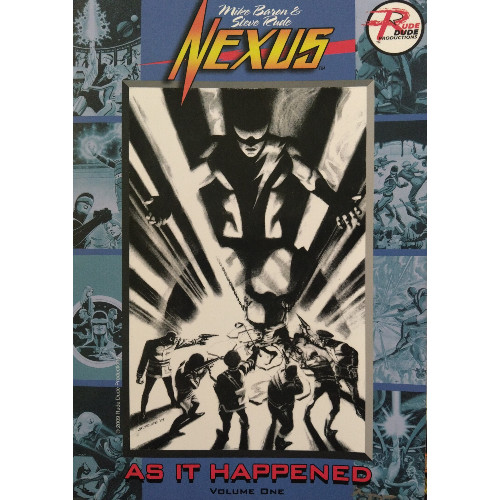
In a previous post, I referenced a masters program I finished last August, wherein I constructed a final thesis project examining–what else?–comics. Specifically, comics from the 1980s, which is quite possibly my favorite decade for graphic literature outside 2000-2010. The sheer number of absolutely fantastic narratives produced during this decade–"The Dark Phoenix Saga," Watchmen, Maus, Walt Simonson's run on Thor, "Daredevil: Born Again," Crisis on Infinite Earths, "Batman: Year One," Green Arrow: The Longbow Hunters, and so on–attests to the brilliance of the era. It's the decade where the British Invasion brought Alan Moore, Brian Bolland, Grant Morrison, and several other creators across the pond to the American comics industry and where independent figures like Dave Sim, Richard and Wendy Pini, and Art Spiegelman shaped the independent publishing sphere. On a personal note, it's the decade where I started "Spider-view."
In that thesis, I highlighted multiple 80s narratives, including "The Dark Phoenix Saga," Frank Miller's "Elektra Saga," Maus, and The Death of Captain Marvel, but I considered several other stories which I never wrote about but still read. I still want to provide a space for reviewing some of those works, so I'll be dropping some posts in the future reviewing those stories which didn't make the thesis cut.
Today, I'm veering back into independent publishing, with a series originally developed by a distributor-turned-publisher called Capital Comics. The comic? Nexus, a series about a man on a mission…though not a mission from God.
Nexus: As It Happened (vol. 1)
Writer: Mike Baron
Penciler: Steve Rude
Inker: Steve Rude
Colorists: Steve Rude, George Freeman, Les Dorscheid (original issues)
Letterers: Steve Rude, Jeff Butler, Mary Pulliam
Issues: Nexus (vol. 1) #1-3, Nexus (vol. 2) #1-4
Volume Publication Date: June 2009
Issue Publication Dates: January 1981, June 1982, October 1982, May 1983, July 1983, September 1983, November 1983
Publisher: Capital Comics (original issues), Rude Dude Productions (volume)
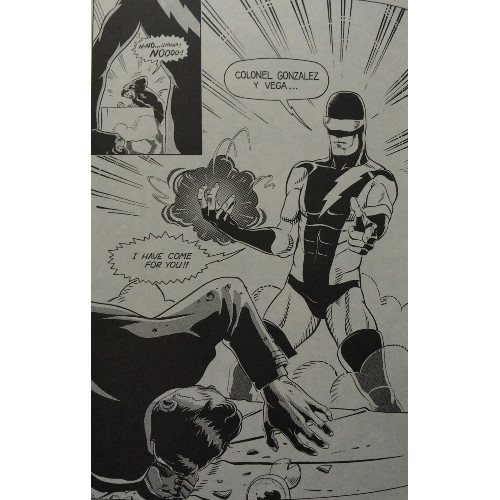
One of the things I've found I enjoy about studying the independent comics sphere is how remarkably in flux its history can be. For example, with a little research, we can learn that, while these seven original issues (published in color though collected in black-and-white here) were published by Capital Comics as their inaugural foray into superhero comics, Nexus eventually transitioned to First Comics after that company absorbed Capital's material, including this series and Mike Baron's other independent series The Badger. And yet the volume I have wasn't even produced by First; it was published by artist Steve Rude's Rude Dude Productions after Dark Horse Comics stopped publishing Nexus…and Dark Horse only obtained the rights after First Comics closed in 1992. First Comics, by the way, has since been "reborn," publishing new material beginning in 2011.
The history of this stuff is wild.
What results is a whole bunch of zigzagging between companies that makes things difficult to track at times but fascinating to follow. Fortunately, for the purposes of this blog, the material I have today was all originally published by Capitol. Rude's small black-and-white volume of the first seven Nexus issues, including the full first limited series and the first four issues of the second series, was the easiest, cheapest option when looking for the best opportunity to purchase some initial issues. I don't plan to explore Nexus much deeper than these first seven issues, so As It Happened, though not retaining the original issues' coloring, was the best option for me. Though I've noted this is a "vol. 1," no second volume has yet been produced. Perhaps if Rude Dude Productions ever drops additional collections, I'll pick them up. For now, this is as far as I go.
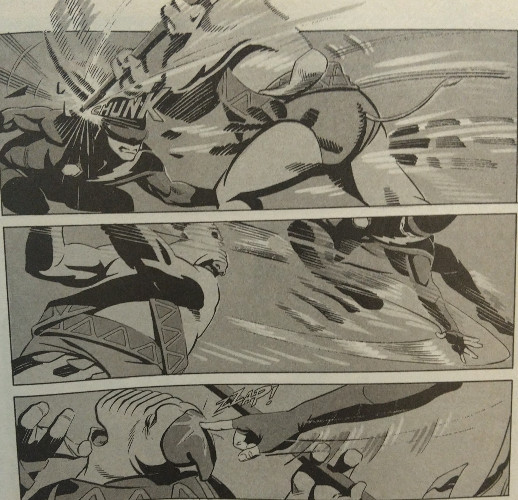
I wanted an introduction to the world of Nexus, an anti-hero whose real name is Horatio Hellpop, and As It Happened did not disappoint this oblivious initiate. Baron and Rude's epic is a sci-fi affair, a futuristic jaunt between planets incorporating several alien species and imaginative military technology. Though I temporarily regretted the lack of color, I found myself pulled in by Rude's designs, filling in the color "gaps" similarly to how I experienced other colorless series such as Maus or The Untold Legend of the Batman.
Rude's pencils and inks are easy enough to follow along–his work reminds of other artists from the 60s, simplistic in narrative communication yet detailed in design, and I found I kept recalling work he did for Marvel's X-Men: Children of the Atom limited series. Each panel adequately conveys the story Rude and Baron craft without overwhelming the reader. Ample grays and shading create additional impact, drawing the eye at moments where color might otherwise distract.
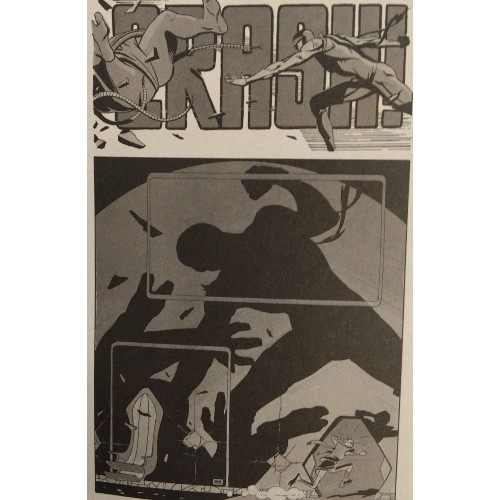
I found myself somewhat hesitant entering the volume–I ended up not analyzing Nexus for my thesis, but the initial intent of doing so is what drew me to the series. Not that I would have otherwise passed over the narrative, but I would have put off reading it a little longer were it not for my scholastic needs. I was familiar with both the artist and writer, Rude for his work on the aforementioned Children of the Atom series, Baron for his contribution to DC's post-Crisis on Infinite Earths take on the Fastest Man Alive. I criticized Baron and fellow writer William Messner-Loebs for how they shaped the Flash, unnecessarily infantilizing Wally West as he strove to fill the swift shoes of his predecessor, the then-deceased Barry Allen. Knowing I disliked Baron's work on Flash (more than Messner-Loebs', I will note), I wondered how much I would appreciate Nexus.
Baron, to my brow-wiping relief, develops a much more thoughtful character in Horatio Hellpop, imbued with similar darker themes which Baron attempted to ground Wally in. His process failed for the Flash, but with Horatio, Baron creates a space to indulge in the darker side of superheroics. Much like Wally, Horatio is a young man burdened with responsibility, asked to grow up far before he must. Unlike Wally, Nexus is not taking on the mantle of another hero but rather establishing his own identity as a murderous anti-hero. Plagued with nightmares which cause him emotional and, occasionally, even physical harm, Horatio is directed towards murderers, terrorists, and dictators, killing them to end the nightmares.
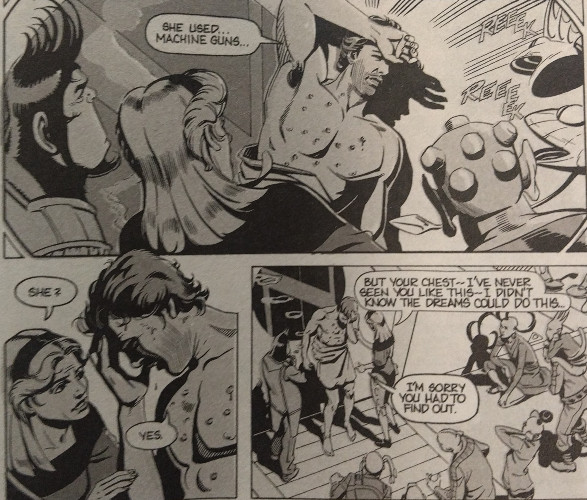
A surface examination of the series may conclude that Horatio is little different from other killers cut from the same cloth, such as Marvel's Punisher or Wolverine. He's a man who murders out of a seeming necessity. Such a conclusion fails to observe Nexus' motivations are not founded on some personal moral high ground seemingly misinterpreted by other heroes who fail to obtain his fatal philosophy. In his very first appearance, Nexus hunts down a fugitive dictator, declaring his intent to murder the man in a very public setting before killing him. Accosted about his actions, Horatio declares he acts out of self-defense, not some misplaced sense of righteousness.
With that, Baron and Rude place Nexus in a category completely separate from his peers. Nexus fully understands the viciousness and lethality of his actions and believes that were he to find another solution to his personal agonies, he would do so. The act of killing brings him no pleasure, and in one later story where he's approached by a group hoping to hire him to murder a dictator, he initially agrees only to then refuse to kill the man. He is no executioner, or in his own words, he is "not a gladiator" in a "Roman colosseum." This is not sport. This not work-for-hire. Death is necessary for him to live.
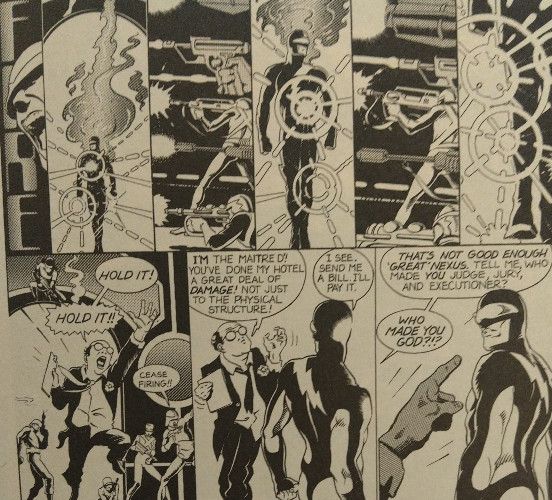
Baron plays coy with the details surrounding Nexus' mission, grounding it in a possible curse but leaving fuzzy some particulars, particulars I believe he would reveal to audiences in later narratives. We learn to empathize with Nexus and the horrific nature of his nightmares–in one issue, he wakes from a particularly visceral dream about a firing squad, himself pockmarked–and other disturbing facts surrounding the nature of his abilities; Baron and Rude imply Nexus' powers have negative effects on the very fabric of space, thus taking his mission beyond its wholly personal roots and casting its consequences across the galaxy. Again, I believe the small mysteries Baron and Rude pepper these first issues with are explored in greater depth later, but Baron's narrative inclinations in particular lend him to create inventive stories that tease the power of future installments. Nexus is, in other words, a step up from his work on Flash…or, as Baron's post-Crisis contribution came later in the decade, it may be more appropriate to say Flash is a step down from Nexus.
Side characters play roles throughout these issues, including a young woman who observes Nexus for purely occupational reasons before falling in love with the vigilante (as one does) or the teeming immigrants and refugees Nexus houses on his home planet, presumably after liberating them from their morally repugnant rulers. These refugees add some conflict to the proceedings as they question Nexus' motivations: the vigilante has rescued them from their oppressors, but now what? He merely scourges the wicked, leaves them dead, but he does nothing afterward. He doesn't improve the lives of a planet's inhabitants; he just prevents them from becoming worse. The argument is similar to complaints surrounding Batman: why does Bruce Wayne funnel his wealth into crimefighting technologies instead of donating it to charity or otherwise actively improving the living conditions of Gotham? In that instance, the answer is simply and, perhaps for some readers, disappointingly meta: would you rather read a comic where Bruce Wayne donates a chunk of his fortune to humanitarian organizations or relief efforts…or where he dresses up as a big scary bat to punch clowns, evil attorneys, and plant women? The question, given your preferences (and those of the general comic reading community) may answer itself.
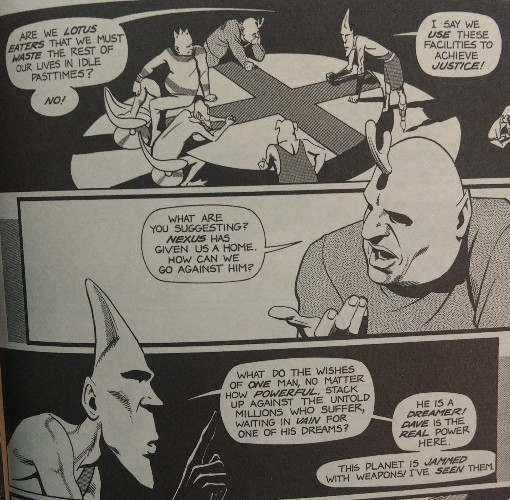
Likewise, questions of Nexus' intentions come into play, but they remain integral to the comic . These alien immigrants wonder aloud if Nexus is doing enough, if his dreams can be trusted, if they wouldn't be better off provided weapons and the means to secure their own freedom and futures. As Nexus wrestles with his own motivations, he must also grapple with the motivations others place on him. Some see him as a means to an end, others as a freedom fighter, still more as a bounty hunter or paid assassin. But he sees himself in a very different light. He sees himself as a survivor. Bringing in allies and saving others is a byproduct of his highly personal goal. Nothing more…right?
I don't know how deeply Baron and Rude wrestled with the moral implications of Nexus' actions in further issues–does he do more with his powers than kill despots? Does he provide more than safety on foreign soil for rescued aliens? Are his powers used to build rather than just destroy? As the volume closes, we're left with more death as Nexus carries out, time and again, the executioner aspect of his role. If there's more beyond him being a tool of destruction, such concepts are not explored here.
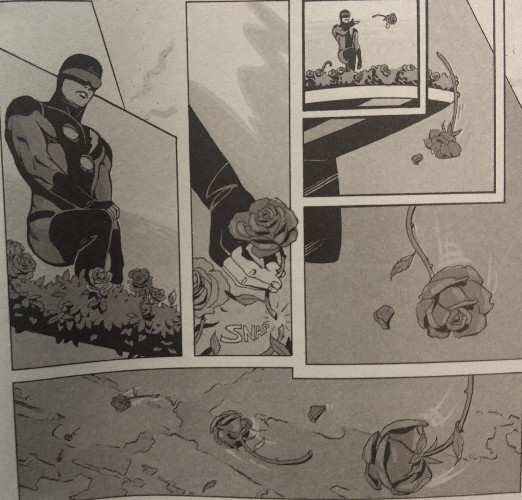
Like with other series I've examined–such as Spawn or Hellblazer–this volume serves as a mere taste of Nexus…and, despite its lack of color, this small collection does not lack flavor. Baron and Rude create a compelling vigilante in these pages, one whose morals and actions are seemingly governed by his sense of self protection. Nexus needs no justification outside himself for how he merits justice. Some folks may find that blunt, his self-serving slayings lacking a philosophical center. I'd argue it just adds a brutal honesty characters like Wolverine and the Punisher refuse to see, a truth wrapped around the darkness of dealing death others may callously wish away.